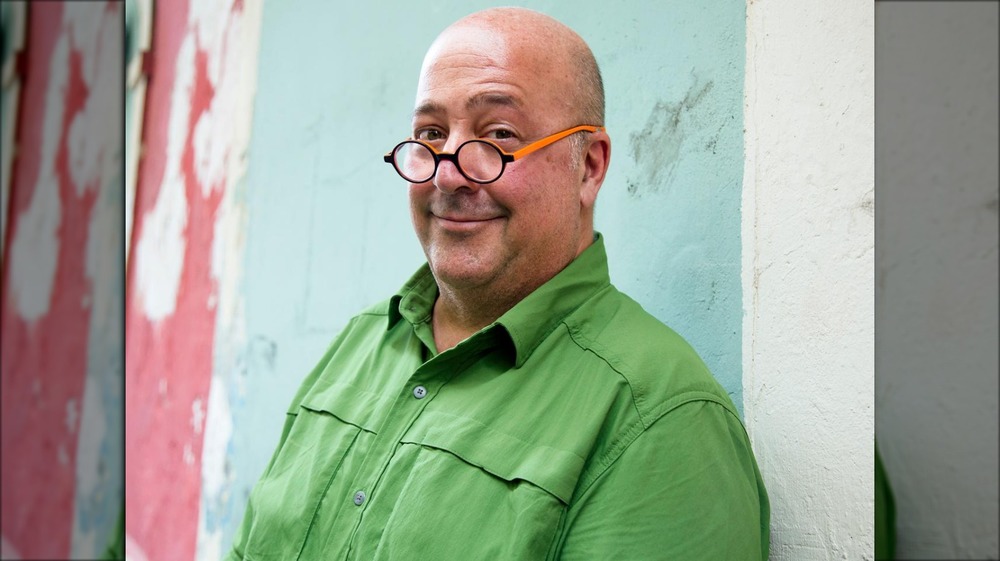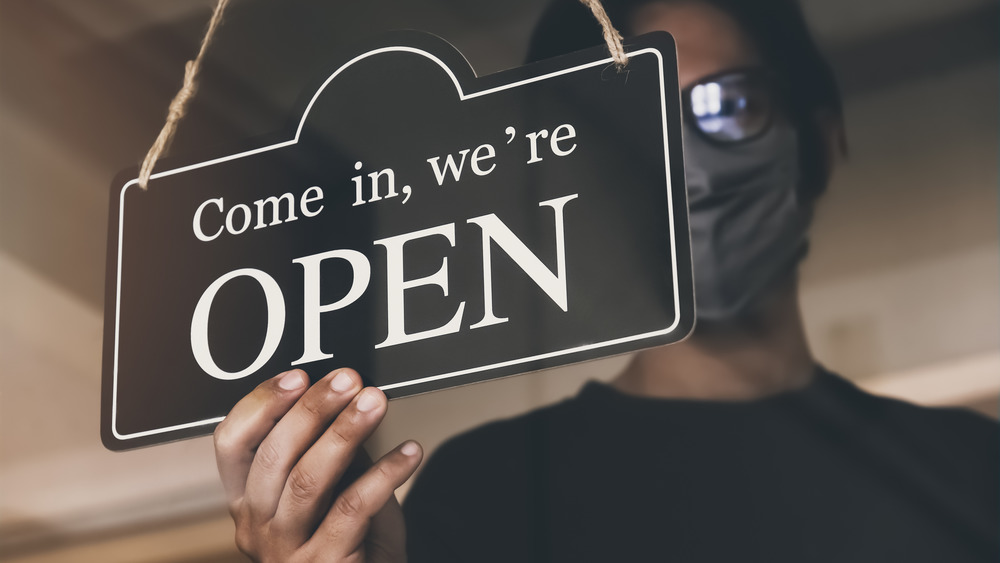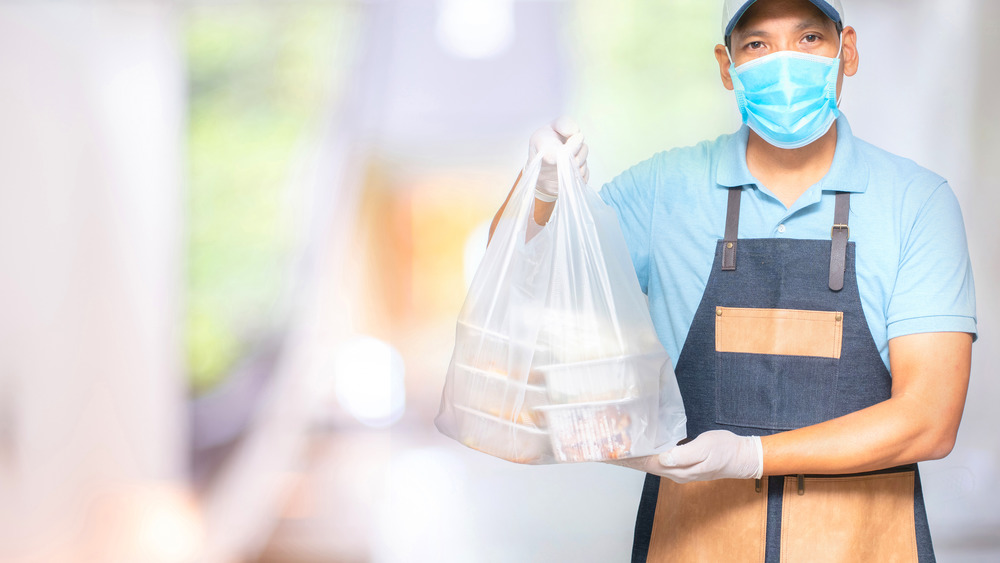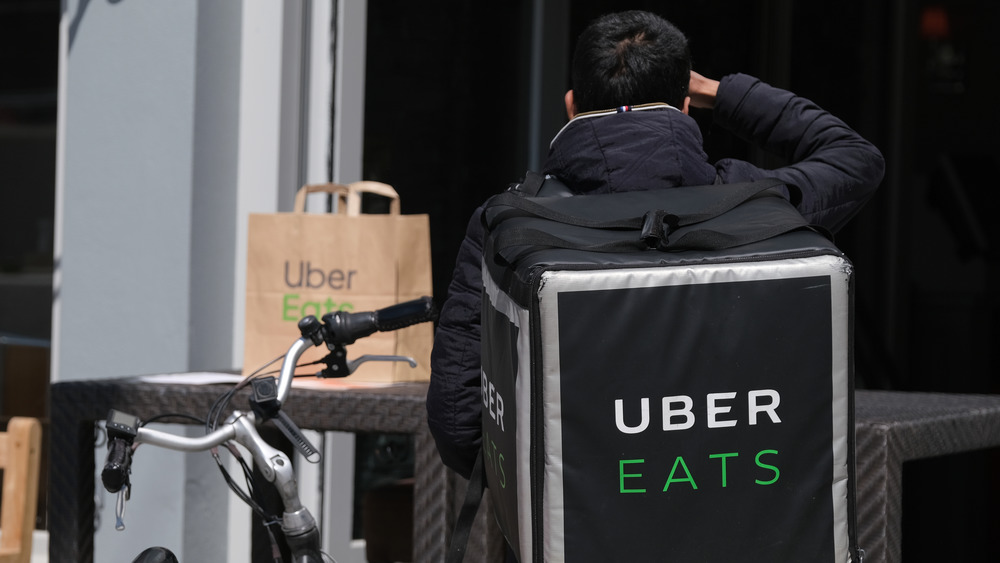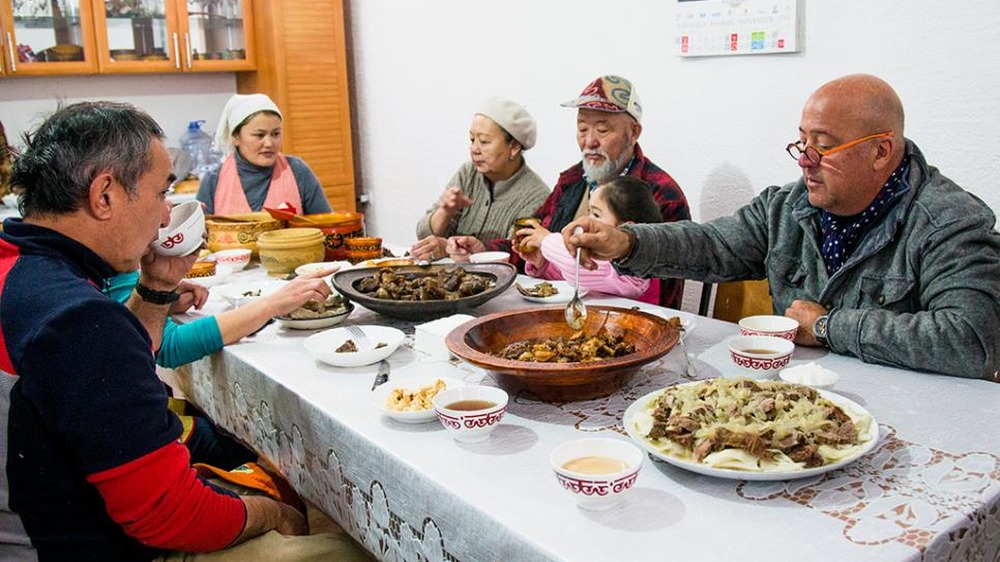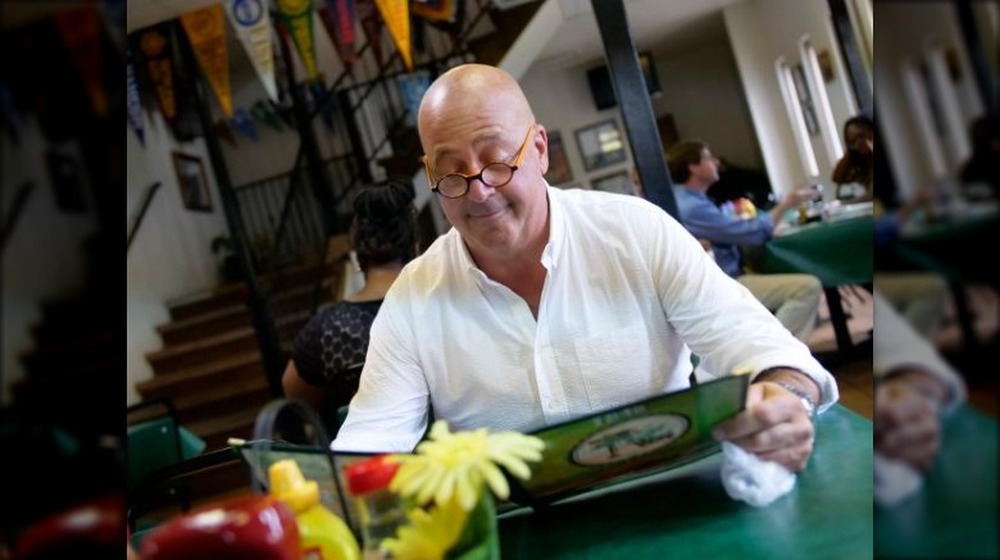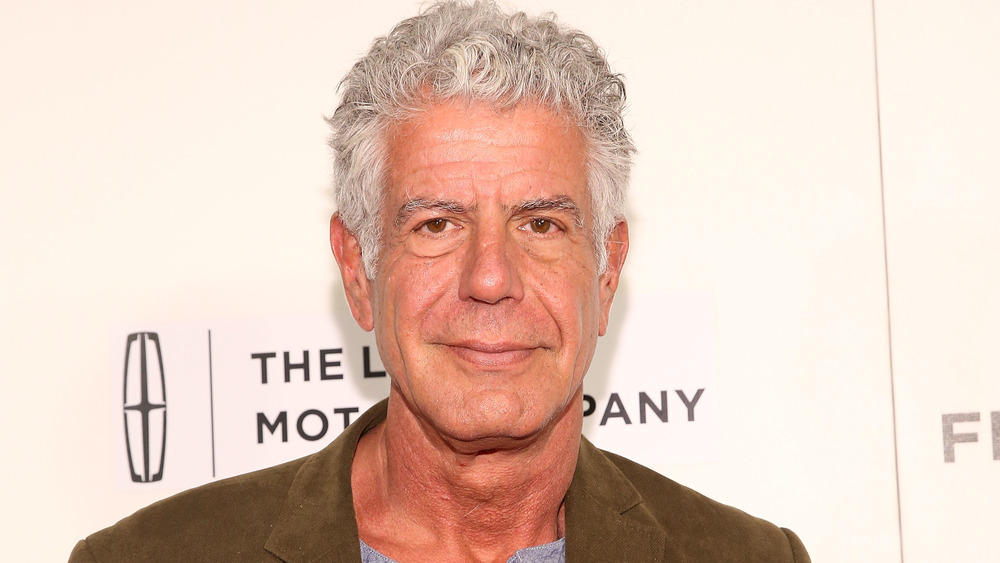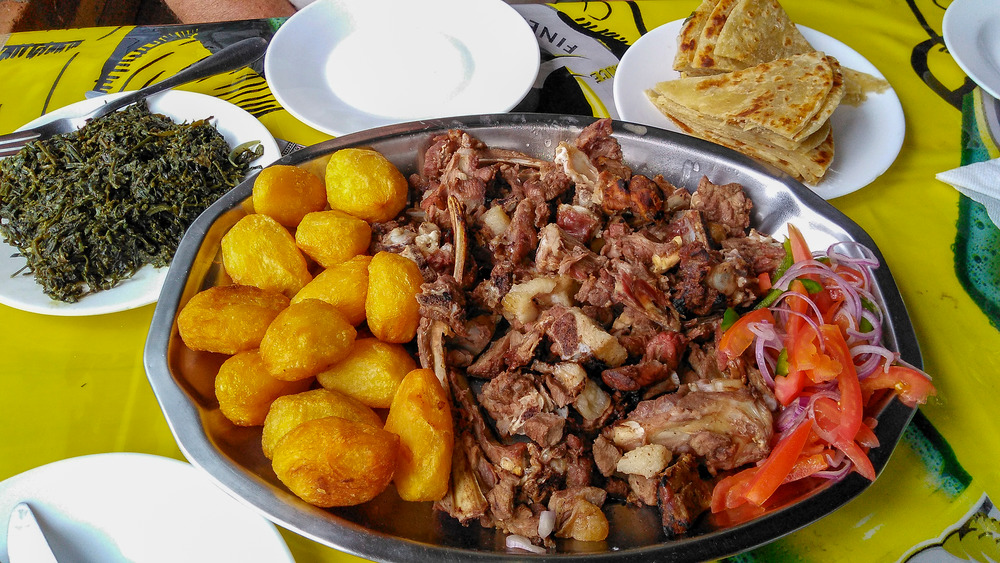Andrew Zimmern Dishes On The Restaurant Industry, Bourdain, And More - Exclusive Interview
There are few culinary legends on par with Andrew Zimmern. Perhaps best known as the globetrotting taste tester on the Travel Channel show, Bizarre Foods, which has entertained audiences for 22 seasons, Zimmern's new series, The Zimmern List, snagged an Emmy in its first season. Binging on Zimmern's far-flung foodie discoveries has offered an escape so many of us crave — especially in recent days, when a masked trip for some tasty curbside pick-up is about as close to "adventurous eating" as we can get. The problem, though, according to Zimmern, is that those local restaurants that have been sustaining us — physically, emotionally, and culturally — during the pandemic, and whenever we've had a crisis, for that matter, are facing a crisis of their own. Without an economic lifesaver, they simply might not survive the economic turndown that's plagued small businesses.
In an exclusive interview with Mashed, Zimmern explained how food lovers can support local restaurant businesses in these tough times. (Spoiler alert: Ordering their food through the app Uber Eats is not on that list!) While we had Zimmern on the line, we got him to dish about his close relationship — and occasional rivalry — with the late Anthony Bourdain, and to give us a behind-the-scenes peek of what it's really like to film Bizarre Foods and The Zimmern List.
Why the government needs to support independent restaurants, according to Andrew Zimmern
You are a co-founder of the Independent Restaurant Coalition. What does this group stand for, and why is it important to you?
Back in March, when this thing, the COVID epidemic — from a business standpoint, from a predictive standpoint — appeared to many of us, to be the long term problem that we knew that it would be, as February turned to March, many of us closed our restaurants, prior to the state mandates in some parts of the country (myself included). About 30 or 40 of us started exchanging emails and phone calls, and we formed, as co-founders, the Independent Restaurant Coalition. I would encourage everyone to go there, sign up, thank your representatives in D.C. if they've sponsored or cosponsored any of our legislation, urge them to if they haven't.
The idea was we wanted to have a group that solely focused on policy change and lawmaking on Capitol Hill, in Washington, D.C., sufficient to assist the most important group of businesses in America that is traditionally overlooked any time we have a recession or a catastrophe — natural, man-made, doesn't matter. And that's the restaurant industry.
When there's a tornado or a hurricane, the first people that show up are people from restaurants — their own restaurants destroyed! They are not picking through their own rubble, unless it's to find equipment that can be used to set up portable kitchens in the areas where others are needed.
When there is a gala, we're the first call from people, to show up and cook food. We always show up and cook food, always. And that's really all we want to do is be able to show up in our own restaurants and cook food and spread the joy that we know takes place when someone sits down in our establishments and shares a meal with another human being.
However, historically, when you look back at the last three big economic bailouts prior to March of this year, the restaurant industry is overlooked. Much smaller, less impactful, less important business genres get relief. They're dwarfed by our size.
The Independent Restaurant Coalition is seeking support for 13 million American employees
When collectively piled together, independent restaurants are anywhere from 580 to 630,000 businesses, with well over a trillion dollars in revenue, representing almost five percent of national GDP. We deploy, depending on the statistics you look at and how you define independent restaurants, whether it's how many units you have to have, whether they're all individual LLCs. There's lots of arcane stuff. But generically speaking, we are between 11 at the low, and 15 at the high, million employees. So let's just shoot it right down the middle, say 13 million employees. We represent right now, the largest percentage from any individual business group of unemployed Americans in the current economic downturn. At the same time, we are the cornerstone of the tourism industry, the cornerstone of neighborhood community, state and national cultural beneficiaries. We are unique employers.
We're the number one employer of single moms, the number one employer of returning citizens, the number one employer of first-time jobholders. Most recently, I found out, the number one employer of last-time job holders. Over the last 10, 15 years, restaurants have become so popular, that people who have retired have said, "If I want to work part-time, I don't want to volunteer at the bowling alley. I'll go work the door at a restaurant, or do something in a restaurant, because it's fun."
Those special employee groups will not find it easy to find jobs in other industries. A single mom loves working three or four shifts in a restaurant, to help make ends meet, because of the flexibility in the hours. She's not going to get a job — or single dads, are not going to get a job at the plant, punching a clock 9:00 to 5:00. It doesn't make sense as a single parent.
Bail out the restaurant industry, instead of the cruise industry, Zimmern says
So we represent special groups. We also are the holders of some special trust taxes. Certain type of payroll and sales tax, most especially liquor sales tax... We pay an exorbitant amount of tax in most states. Obviously, in some, there is no sales tax, like Florida, because of tourism... But we, in the most majority of states, are the biggest contributor to rural and small community tax benefits, or tax pools.
If you think about a small town in northern Minnesota, population 5,000, there might be two hardware stores. But there are many restaurants of all different types. And so, the contributions to the fabric of society, from Main Street, USA and small towns, to our fancy restaurants in big cities, is a vital, vital industry. And most importantly, because of the vast majority of employees we have, and the five percent of GDP that we represent, we should be given relief first, not the cruise ship industry that has... well, they've gotten the bailout every single time before us. They carry almost no employees. They pay almost no taxes. They all are offshore companies. It's horrific.
So I think we are preeminently in need of relief. And I think the last thing that I would probably add to that, unlike the cruise ship industry... let's just stay with that one. If we do not get the relief package that is the Restaurants Act, that Congressman Blumenauer and Senator Wicker rolled out in bipartisan support in the House and the Senate... It's passed the House. It's now waiting to be voted on in the Senate, as part of Speaker Pelosi's Heroes Two bill.
The details of the Restaurant Act
It calls for $120 billion over the next 12 to 18 months, to support independent restaurants, including tax credits that allow us to bring back all of our employees. So this is very, very crucial.
If that bill does not pass, two things will happen. One, we will see an extinction event, and we will lose 75 percent, maybe more, of restaurants in America. That would be catastrophic to our nation's economy and to our unemployment numbers. But more importantly, the Fed itself, the OMB, the U.S. Chamber of Commerce — all the independent institutes that have done studies on this — everyone agrees.
The one thing you get everyone to agree on, if restaurants don't get the money, it's going to cost America about $270 billion over 12 months alone. So it's like pay $120 [billion] now or $270 [billion] later, at a time when we really need... And I'm kind of a fiscal conservative in a sense. I pay really close attention to this stuff. I am a fan of a bigger government.
I think there's a purpose for bigger government. We're living through one now. But I'm fiscally, generally, a conservative person. But you'd have to be a moron not to pay $120 [billion] now, to save $270 [billion] over the course of the year. It's fascinating how many food programs do that. [Supplemental Nutrition Assistance Program] does that. SNAP is one of the greatest public programs ever invented. I think for every dollar that goes out, a buck 18 goes back into the economy. That is something that works.
Restaurants earn very little profit, according to Zimmern
Restaurants work, despite the fact that 93 cents of every dollar that comes into a restaurant goes out the backdoor. On average, we make about seven percent in profit. That's extremely low. People get into this business for the joy that they bring their communities, not to get rich.
So yeah, that's the work of the Independent Restaurant Coalition. We've been tireless and at this since March. We were successful in getting a Minnesota congressman, Dean Phillips, and a Texas congressman, Chip Roy, a Democrat and a Republican, to fix [Paycheck Protection Program]. We worked with them on drafting that legislation and getting that all squared away. And now we've turned our attention solely on what has now been called the Restaurants Act by its writer, Congressman Earl Blumenauer. So very, very, very much trying to get that passed.
How foodies can support local restaurants
What do you think food lovers can do right now, to support restaurants, if they are anxious about eating out in a pandemic?
Find the places in your neighborhood. I always believe in growing where you're planted. Find the places that you love, the places that you eat out in, the places that you have relationships with, the places that make you feel good. Frequent them.
Everyone is doing takeout. A lot of places are doing delivery. I'm trying to spread my love around and dine out every week in one of the restaurants that I love in my town. It's very difficult. I have a responsibility to my employees, to my TV contracts, a lot of the other things that I do to keep myself healthy and well. I also believe in wearing a mask, staying socially distant, washing my hands. But I have decided I am going to dine in one restaurant per week.
Now, we have done that outside, in five of the last six weeks. I did one inside meal, in a booth in the corner, far enough away from everyone else that I felt comfortable. But winter is coming. It snowed this morning, here in Minnesota. It didn't stick, but it snowed. So it's something that's really on our minds, as our city begins to grow, air filter systems, all the rest of that stuff.
Restaurant goers should get political, according to Zimmern
I would encourage people to push their city and state governments to help those restaurants that cannot afford the partitions and the [personal protective equipment] for their employees in the kitchen and the air filtration systems and all that stuff that the fancier restaurants can. Hopefully, the pressure on city and state governments will go upstream, or downstream, I guess, depending on how you want to look at it, to the federal government, where we have seen a crushing absence of leadership.
This is a bipartisan no-brainer, which is why we have so many senators and congressmen in favor of it. We're almost at 50 percent of the Senate approving us. We're over 220... well, it already passed in Congress, so I guess it's a moot point. But the fact of the matter is that this is just common sense. But that's sorely lacking in Washington over the last four years. And so, we really are seeing a crushing deficit of federal leadership.
And we, by the way, restaurants, and I'm especially sensitive to it here in Minneapolis, restaurants, along with all the other small businesses, are being crushed by the twin pandemics, the viral and the cultural. And there's a lot of overlap there. Again, from a failing national leadership perspective, at a time when we need to come together, we have leadership in Washington that seems hellbent on dividing us. And that runs counter to getting Main Street up and running again, which is why it's so shockingly appalling that this current administration and those who work in it, struggle so mightily to stand up to the bully-in-chief. That everyone knows Main Street needs to be supported.
The cliché is Main Street, USA for a reason. From an economic standpoint, a job's... I mean, there's no viewpoint in which it doesn't make sense to support Main Street. And yet, as of our conversation, we do not have another tranche of dollars ready to go out, to help those in need.
The fact that I have any money in a savings account, puts me, I think, in the top 5 percent... I mean, it's shocking when you see the statistics. We have 20 percent of Americans [who] pre-COVID, were not below the poverty line, [who] because of COVID, have been pushed below the poverty line. This is catastrophic, and it's burying our head in the sands. Take a look at the stock market, something that only like a small percentage of Americans even participate in. This is not about the stock market. This is about Main Street, and the biggest player on Main Street is not the cruise ship industry, it's the restaurant industry.
Why Andrew Zimmern says Uber Eats is like a 'low-level drug dealer'
What do you think of delivery services, like Uber Eats, Post Mates, and GrubHub? Do you think they've been a good partner to the restaurant industry during the pandemic?
No. I would like to see all the delivery services to some sort of moratorium on their fees and allow the restaurants to keep more of the money. They're behaving more like low-level drug dealers than real partners to the industry. A low-level drug dealer gives you your first taste for free, then they get you hooked, and then they jack up the price and lower the quality. And that's what we've seen from food delivery services in general. They came out of the gate hot, "Oh, we're going to give a discount. Oh, we're going to do a special week, where the service charge is only five percent."
It's like, "I get it, Mr. Delivery Service Inc. Your whole business model is based on the amount of money that you charge as a fee for services." That's their business model. I get it. But to do so when you take advantage of pushing the very industry that keeps you alive, keeps pushing them underwater, as you swim them out to the deep end, it's not right.
Do you recommend that independent restaurants not partner with these delivery services?
Well, you save as much as 30 percent. I mean, do the numbers. If you've gone from 100 percent of whatever it is over last year, 100 percent of sales, and now you're at 40 percent of sales, a big portion of that 40 percent of sales from the year over last, is made up by food from these delivery services or takeout, or whatever. So if you're doing your own, you're saving 30 cents on every dollar.
What is the best way to order delivery, if you should not use Uber Eats?
Well, I love contact-less pick-up for the restaurants in your neighborhood. Show your face, tell the people who are working there you support them, wave in the window, give them a thumbs-up, do a virtual hug from outdoor. I mean, those people are showing up as deemed essential, to help keep the food chain, to keep other industries alive.
Food people always show up, and I think it's vitally important that we recognize them. So I would encourage people, take the dog out for a walk, go to the neighborhood restaurant, and do pick-up, whether it's snowing or raining or whatever.
Andrew Zimmern reveals what Bizarre Foods and The Zimmern List are like behind the scenes
What goes on behind the scenes when you're filming 'Bizarre Foods' and 'The Zimmern List'?
The colossal amount of time and energy that it takes to make an hour of quality television. Zimmern List just won an Emmy. We're super-proud of that.
Bizarre Foods, as the years go by, we shot that 13, 14 years [ago] and made hundreds and hundreds and hundreds of episodes, and it won tons of awards. You see them... and then I remember, "Oh, yeah. That was 10 days of camping in sub-zero weather at night, in Mongolia, on the steppes, just to record 15 minutes of a show, so that people could see what it was like with a family that is truly living a pastoral lifestyle, living with their animals, herding them across the steppes over the year, depending on rainy and dry season, and profiling their lives."
The 10 days that we spent in Botswana, with the Gantoise, a protected tribe in that country, two-and-a-half days to get in, two-and-a-half days to get out, and seven days of nonstop shooting, I don't think we turned our cameras off. It was mind-boggling. It's a lot of work for 42 minutes of TV.
Once a year, well, we had an "we-almost-died-doing-that sort of story." It's an awful lot of work and awful lot of blood and sweat and tears. And I think that there's no amount of talking about can underline how much of a group sport TV is.
People always think of whoever the face of the show is, but it is as much about the writers and editors and casting producers, and on, and on, and on. It's as much about them as it is about me.
Is there one food you ate while filming Bizarre Foods that everyone needs to try?
Well, the easy answer is all of it, because I really believe that. In rural Vietnam, Thailand, Cambodia, they all have... there's a lot of street food by the side of the road. And frequently, especially the most rural areas, there are corners... because they don't have rest stops, like we do on our freeway system here. They have rest stops, which is just a corner, where maybe there's not even a stop sign, but two roads will cross. But there's enough little towns and villages. A lot of people taking the bus, employees, or near big coconut farms, or whatever is out there, in the sugarcane farms, wherever you happen to be, rice farms.
And people congregate, and you can always tell these sort of crossroads, because an outdoor sort of market pops up. Some are daily, just at lunchtime. Some are weekly, like on a weekend day. Some start as one or the other, and then grow, because buses or other long-haul truckers kind of stop there and history just kind of develops. But there's a lot of food served on the side of the road in these areas.
And one of the things that's very popular there — you don't see a lot of it in the city — because they have so many ducks and chickens, laying eggs, many of which are fertilized, they grow a lot of little chicks. But they know that only so many grow to maturity, and they can only sell so many.
And they don't have a lot of hangups about food. So whether it's small little birds, fully-grown, to be the size chicks, ducks or chicken chicks, or goose chicks. They take the little babies, and they pluck them, clean them, marinate them, and then deep-fry them. And then they put them in a bag, with a little bit of... seasoning, and hand it to you. You just hold the little beaks and heads and eat everything, because all the bones have yet to be firm.
It is the best tasting chicken, duck or goose you'll ever have. It is the... absolute best version of that. Baby anything is good. So it is something that I think everyone should try, because it's quite delicious.
Is there anything from 'Bizarre Foods' you wouldn't eat again?
No, because this is something that's really interesting. There was a coconut grub in the Philippines. I ate them in four or five, until I finally ate them on the river in the Peruvian Amazon, where they cook them in a different way. And I had an epiphany. They were delicious. I couldn't stop eating them. The other places — it was more of an interesting experiment.
And I realized that just like a pork chop, you can overcook a pork chop, or you could steam a pork chop. Some of these places were just eating to get it to be edible. But in this little town — [it] wasn't really a town, a village — there were these guys in this food market, and they took the stomachs out that was filled with rotten wood, and they soaked them in a bucket of sour orange juice, wild sour oranges. Then they skewered them with a piece of potato on the end, and grilled them until they were crispy, like chicken skin. And I probably ate eight of them that day.
They were just fantastic-tasting. So there's nothing I wouldn't try again, because you never know when even something that you didn't like is going to be made delicious by the person who's preparing it.
How Andrew Zimmern feels about his new show winning an Emmy
What did it feel like when you won your Emmy for The Zimmern List?
Unbelievable, in the literal sense. Well, you don't grow up... I mean, I guess if you're an actor or something like that, and you're like, "Yes, that's my goal." Our goal at our production company is to make important television about adventure learning that leaves the world a better place than it would be if we didn't make the show. That's our mission statement.
Secondarily to that... Intuitive Content, my production company that I own — we talk about we're premium creators of content, whether we're making ads for brands, whether we're doing B2B videos whether we're doing branded content, whether we're doing digital content, or whether we're doing linear content on big networks, like our MSNBC shows, or Food Networks show, or Travel Channel shows, on and on and on.
We believe in premium content, we believe in being storytellers. Way down on that list, and we have it written down, it says, "We want to win awards." Because years ago, we sat in a room, and everyone was like, "What's our mission statement? What's our hierarchy of desire? What do we stand for? What are our values?"
So our storytelling is up there, our passion is up there, our wanting to do good is up there, drives our company. Adventure learning is up there at the top. But way down at the bottom is, "Win awards." Because someone shouted out, "Win awards." At one of the meetings. We all went, "Yep, we want to do that."
But you don't count on it. We don't do a show and say, "We're going to put this in it, or that in it, because that will win us an award." We just try to do the best thing we can with our network partners, for example, or our branded content partners. We've won some incredible awards for our branded content, and..getting nominated, we were nominated for two Emmys. We won one. Did I think we had the best show out there? Absolutely. I always think that.
And I mean no disrespect to the other people who were nominated, because I also was stunned to be in their company. But if you don't feel confident about your own stuff... I mean, I don't know. I mean, I guess I'm talking out of two sides of my mouth if I say I was surprised, but I say I was so proud of our stuff, which is like I'm so proud of our stuff.
I look at it all the time and go, "We should be winning Oscars, Tonys, Emmys and Grammys for that stuff." And people remind me, "We don't do music." And I'm like, "We should still win a Grammy for that."
So when we were nominated, I was thrilled. Nominated for two Emmys? Holy cow. But now our names are on the Emmy for Zimmern List for best travel adventure show, and I... I mean, that's the biggest recognition in our industry when it comes to awards. So I was just humbled and gratified and so proud of our team, because it really is a team sport, and thrilled. No one can take that away from us. So I'd be lying if I said anything different.
The most fascinating part of this whole thing is that it doesn't change what we do or what we desire to do. The next day, we were still trying to do the shows that we felt would leave the world a better place because of our storytelling.
How Andrew Zimmern really feels about Anthony Bourdain
What was Anthony Bourdain's impact on the culinary world — and on you, personally?
I don't think his impact on the culinary world is even really calculable now. I think we have to wait a couple more years. And the reason is, there are so many people who watched his shows for the 13, 14 years that he was making them. And they're coming of age now, and they're going to impact our industry for decades. And at that point, we really will be able to see.
I can tell you he was the most dynamic and engaging and fascinating human being. Every guy wanted to be his best friend. Everyone loved him, because he was so brilliant, so captivating, so charming when he wanted to be, or cuttingly, cunningly, beautifully evil when he wanted to be.
And he had a tremendous impact on me, because he... As his friendly competitor during the first four or five years we were on the network together, growing our friendship, there was a lot of competition. It was hysterical. We'd call each other late at night or send texts or emails. And he'd be like, "How'd you get into Cuba?" We went to do our Cuba show, right? And I was like, "Well, how did you get into Iran?" And then he'd text me, "How did you get into Syria?"
I mean, so we're constantly playing that game. Over the last four or five years of his life, we developed a deeper friendship. As our kids grew older, as we became more mature and better folk, we endured a lot of the same life struggles, went to some of the same schools, worked in some of the same places, wound up doing some of the same .. I mean, our overlap is quite something when you look at it.
So his effect and impact on me was phenomenal, and rarely a day goes by that I don't think of him and I don't miss him. He is someone whose... Especially the last year, I just would've loved to have seen what he had to say about Donald Trump.
If you could channel him, what do you think he would say about President Trump?
Oh, I think everyone knows what he would say. I don't think I need to go out there, although I know that he would say it much in the same way that one of his favorite food critics, the great A.A. Gill. He would create a few sentences, so masterfully developed, that it would be the ultimate in ironic and cutting verbiage. I would love to have seen how he handled... I would love to have had dinner with him and I just listen to him rant about it.
The best place for a foodie to travel, according to Andrew Zimmern
Where should someone eager to explore new flavors travel, if they could go anywhere in the world?
Africa. There's, and I should know this, 40 some odd countries on that continent, something like that, massive. Within each country, in some cases, hundreds of cultures, because of the way the tribal systems have developed there.
Africa is really a continent of thousands of cultures, because aside from recent history, it was colonial European people, who put lines on the map and gave those countries names through thousands of cultures there. The food is extraordinary, extraordinary. The seafood of coastal Senegal, versus the stew and tajines of the mountains of Morocco. The incredible seafood off the coast of Namibia.
Some of the best seafood in the world is off the Skeleton Coast in Namibia, where the coldest, swiftest moving water in the world is, versus the incredible seafood tradition of Egypt that no one thinks about, because everyone forgets they have a massive coastline. The tribal wisdom of the cooking of Central Africa, and the trade that has gone on there for thousands and thousands of years, make it not only real traveling, but real eating and a real voyage of discovery.
And we, frankly, especially as Americans, owe that country such a great debt that can never be repaid... Look, Paris is great. Ho Chi Minh City is great, Beijing is great, Bangkok is great, Tokyo is great. I mean, South America, Western Europe. I mean, go on and...
[But], you want to travel? Go to Africa! You want to learn something? Go to Africa! You want to have your soul reset and re-calibrated? Go to Africa! You want to really have an adventure? Go to Africa! You want to taste food you've never tasted before that will blow your mind? Go to Africa!
